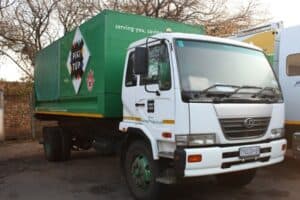Joint training between Saps and military intelligence needed.

On Thursday, Operation Prosper came to an end.
It was originally scheduled to run until 12 October authorised by the commander in chief, President Cyril Ramaphosa, allowing for a maximum of 25 000 members of the South African National Defence Force (SANDF) to be deployed in support of the South African Police Service (Saps).
This unprecedented internal deployment was necessitated by the waves of public unrest that erupted, primarily in KwaZulu-Natal in the third week of July, spreading north to Gauteng, with isolated outbreaks in other provinces.
The SANDF was tasked to deploy where requested by the Saps to allow their members to execute their tasks efficiently and safely.
It’s vital that we remember and understand the parameters of the mission, the soldiers were deployed in support and in cooperation with the Saps not to do the work of the police. This was not a state of emergency. 25 000 members of the South African National Defence Force (SANDF) to be deployed in support of the South African Police Service (Saps).
The numbers of physical “boots on the ground” have fluctuated daily, depending on the police requirements and our need to rotate troops between training, deployment and rest.
ALSO READ: SABC confirms SANDF deployment to its headquarters
As we come to the end of this operation, there are many lessons that we have learnt and much that we will be discussing across all our leader groups to ensure that the SANDF continues to evolve and perform at its optimum capacity.
As matters stand, we have a number of ongoing internal commitments: Operation Corona which has nothing to do with the pandemic, but the protection of our landward borders, and Operation Vimba, the help by the SA Military Health Service to the Gauteng health department in combating Covid-19.
We are also committed to our United Nations and Southern African Development Community mandated missions elsewhere in Africa, which are traditional peacekeeping and peace enforcement by nature.
There have been many successes during Operation Prosper, primarily the continued use of the one-force concept, deploying reserve and regular forces in tandem, as one.
We have been able to successfully deploy our infantry combat units into highly volatile environments in their primary military role of motorised infantry and composite units comprising other combat, combat support and combat service support units in their secondary roles in less volatile areas.
We have also deepened and expanded our relationship with the Saps at all levels nationally. But we have also learnt a great deal about ourselves, our abilities, the equipment we use and our training.
One of the shortfalls in our training has been that we have concentrated on peacekeeping and offensive external operations, at the expense of counterinsurgency training, which part of Operation Prosper has actually been about. Counterinsurgency warfare has its unique challenges.
We need to look at ways of improving communication at all levels and create a common understanding of the different areas and scope of responsibilities between the different agencies the military, the police and intelligence.
For example, during cordon and search operations the military secures the perimeter effectively to allow the police to search unhindered.
Even something as small as getting to the objective together is a very different concept, depending on whether you are in the police or in the military: soldiers travel in convoy, while police might travel individually and at will.
We need to ensure going forward that there are greater degrees of joint and inter-agency training between police, military and other agencies, so that we can operate far more efficiently.
Furthermore, maybe we need to introduce civic education at school so that the youth can also understand not just what the army does, but the entire shape and form of how a society functions too.
Such education would, among others, bear the fruits of a national identity and respect for the deployed soldiers, rather than trying to provoke them.
ALSO READ: SA unrest: More than 12 instigators expected to be arrested, says Cele
One of the most disheartening things for our members on the ground has been to discover how the elderly citizens almost entirely disavowed the looting but how a significant proportion of the youth mostly found nothing wrong with it.
Our members, too, need more training on operating internally. They are trained to be aggressive under fire.
Internal operations are very different and very nuanced and because of that, our members have often become defensive and almost disempowered, rather than opt for the offensive default which they have been trained to do in conventional warfare.
We have also been very pleased with the conduct of our soldiers, given the scale of this deployment and its complexity.
Despite some minor transgressions, the level and standard of discipline has been exemplary.
Operation Prosper has provided us with a thorough test of our systems – from command and coordination with civil authorities to troop movements and even how we cater in temporary bases using mobile kitchens to feed troops with different dietary needs.
–Brigadier-General Pharo is director conventional operations, Joint Operational Headquarters, SA National Defence Force
Support Local Journalism
Add The Citizen as a Preferred Source on Google and follow us on Google News to see more of our trusted reporting in Google News and Top Stories.








